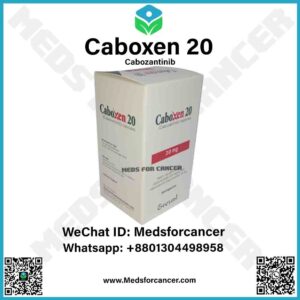Sunicent 50 mg Capsule (Sunitinib)
$40.00
Product Name: Sunicent
Generic Name: Sunitinib
Strength: 50 mg
Whats App: +8801304498958
Sunicent 50 mg Capsule (Sunitinib) is a therapy taken through mouth, used to treat different types of disease kidney cancer, gastrointestinal stromal tumors (GIST), and certain pancreatic tumors. Sunicent slows down the receptor tyrosine kinases, and blocks signals that help cancer cells grow and form blood vessels. This targeted therapy may helps slow disease progression and usual side effects include fatigue, diarrhea, nausea, appetite loss, and skin discoloration.
The US Food and Drug administration has approved Sunitinib for treating recurrent renal cell carcinoma of adult patients on November 16, 2017. This approval was based on multi cancer.
What is Sunicent 50 mg Capsule (Sunitinib) used for?
Sunitinib is approved by the FDA and WHO to treat the following disease in adult patients
- Advanced Renal Cell Carcinoma.
- Gastrointestinal Stromal Tumor (GIST) after disease progression on or intolerance to imatinib mesylate.
- Advanced Pancreatic Neuroendocrine Tumors (pNET), where disease is progressive.
How to take Sunicent 50 mg?
-
The normal adult dosage is 50 mg once daily for four weeks to be followed subsequently by two weeks off as part of a six-week treatment cycle. Adjustment in doses shall be made by the physician based on response and any side effects.
-
How to take:
-
Swallow capsule whole with a glass of water. This medicine may be taken with or without food. Try to take it at the same time every day.
-
Do not stop dosing. In case one dose is missed, take it at the earliest time possible; however, if it is already time for the next dose, then do not take the missed dose. Never take two doses at once.
-
- Only discontinue using sunitinib when directed by your medical practitioner, even when you begin to feel better.
-
Observation of your pressure, counts, and state of the liver will be looked at while on this medicine.
Precautions and Safety Advice
Before beginning treatment with sunicent 50 mg, discuss with your healthcare provider your full medical history, all medicines you are taking, and allergies. This helps make the treatment run safely and effectively.
1.Gestation and Nursing
Sunicent has the potential to harm an unborn baby. Do not take it during gestation. Females should use a proper method of birth control while getting treatment and for some time after the last dose. Do not nurse babies while on Sunicent treatment.
2. Renal and Hepatic Function
Regular tests on the liver are needed as sunicent can work its effects on this organ. Patients who have pre-existing conditions of the kidney need close checks.
3. Cardiac and Blood Pressure
Sunicent may increase the pressure and put effects on the heart. Your doctor may want to check your pressure while you are taking it.
4. Bleeding and Wound Healing
This medicine can cause bleeding or wounds to heal very slowly. Tell your doctor if you plan any surgery.
5. Interactions with Other Medicines
Certain medicines (antibiotics, antifungals, HIV medicines, and herbal products such as St. John’s Wort) may interact with Sunicent 50 mg. Always provide your doctor with a full list of your medicines.
6. General Safety
Do not drive or operate machinery if you are feeling dizziness and unusual tiredness. Avoid the consumption of large amounts of alcoholic beverages since it may make side effects worse.
What are the expected side effects of Sunicent 50 mg?
Common Side Effects (more likely to occur)
Most people feel tiredness and weakness- unusual energy is very common. It causes nausea, can also cause vomiting, diarrhea or simple indigestion (loss of appetite). Mouth sores (stomatitis) painful ulcers or irritation inside the mouth. Skin changes-yellowing of skin, dryness, rash or changes in color of skin and hair. Hand-foot syndrome-redness, pain swelling or blisters on palms and soles of feet. It can cause high blood pressure to develop while on the drug that will often need to be treated with medicine.
Serious Side Effects (less common but potentially harmful)
These require close monitoring and sometimes urgent medical care:
- Liver Problems
Symptoms- yellowing of the eyes/skin, urine becomes dark, pain in the abdomen. Risk- can develop into liver failure though seen in rare cases. Periodic assessment is strongly recommended.
-
Other Heart-Related Effects
Sunitinib may decrease the function of the heart or cause heart failure. Symptoms include shortness of breath, swelling of feet/ankles, and irregular heartbeat.
- Bleeding and Clotting Disorders
It might just show by nose bleeding or passing blood in stool/urine. In rare cases, it might be internal bleeding or blood clots.
- Wound Healing Problems
Delayed healing after surgery or injury.
Important to stop the medicine temporarily before surgery if advised.
- Thyroid Dysfunction
Thyroid Dysfunction It may cause hypothyroidism, low thyroid function presenting with weight gain, sensitivity to cold, and fatigue. T3, T4, and TSH levels are recommended periodically.
- Tumor Lysis Syndrome (rare but serious)
umor Lysis Syndrome (rare but serious) Rapid destruction of cancer cells releases substances into the blood. This can cause kidney damage if not controlled.
- Severe Allergic Reactions (rare)
Severe allergic reaction may appear as itching, skin rash, swelling of faces and breathing problems.
How long can you take sunitib?
The duration of Sunitinib 50 mg therapy will be defined by your cancer type, overall health condition, and how well your body responses to the medicine. It is normally taken in cycles of treatment for 4 weeks daily followed by 2 weeks off. Some patients may take the drug for very many cycles if they have controlled cancer and side effects allow it. Your doctor will decide how long you are going to stay on treatment and also wants to see you regularly.
How does Sunitinib work?
Sunitinib acts as targeted therapy. It is not a classic chemotherapy agent but works through inhibition of protein enzymes, known as tyrosine kinases, and pathological signaling pathways involved in the growth of cancer cells and in developing blood vessels feeding cancer. Blood vessels carry nutrients to cancer, so blocking them means that the drug stops tumor growth as well as the supply of blood to cancer. At first, this primarily controls the disease; later it may decrease tumors.
You must be logged in to post a review.









Reviews
There are no reviews yet.